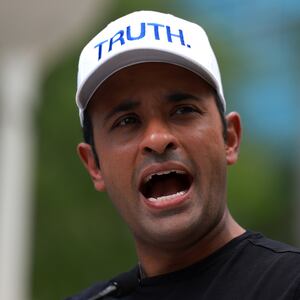Few travelers would likely be familiar with the meaning of “SSSS” if it was stamped on their boarding passes at the airport. If you’re Muslim, however, this has probably happened to you or someone you know in the last two decades because of the terrorist watchlist that was implemented post-9/11.
While the watchlist reportedly has over 1.6 million names on it, it has continued to insidiously operate in the background of most people’s travel experiences in and through the U.S.
The watchlist made news last month because of a lawsuit brought by Farid Sulayma, an American and Muslim leader living in Seattle. Singled out for scrutiny each time he travels, Sulayma cannot check-in online, is routinely pulled aside for additional searches, and has been questioned, cuffed, and detained for hours simply for trying to get where he needs to go. Like many other Muslims, he is a victim of a national security policy that has evaded accountability, but which continues to exist as a way of perpetuating the humiliation, demonization, and otherization of Muslims.
While the post-9/11 context has brought many critical discussions about human and civil rights in the implementation of national security policies, the terrorism watchlist—billed as a preventive measure—has managed to operate outside of many of these constraints. Built on the presumption of guilt until proven innocent, not only are those put on the list unaware of their placement, but the government will also neither confirm nor deny that a person’s name is on the list.
The threshold to be placed on the watchlist is distressingly low, relying on “reasonable suspicion to believe that the person is a known or suspected terrorist.” Though the government claims that it has “safeguards” in place to prevent someone’s unwarranted inclusion on the list, these measures were built on the deliberate and systematic erosion of the rights of those targeted—disproportionately Muslim—whose abuse has been institutionalized and rendered inconsequential.
Despite the ongoing harassment and scrutiny that Muslims have long complained about at airports, Sulayma is not alone in demanding government accountability. In fact, he joins a chorus of others who have similarly challenged the government’s use of the terrorist watchlist to target innocent Muslims.
In the case of Elhady v. Kable, 23 Muslim Americans sued the government for their inclusion on the watchlist. The lead plaintiff, Anas Alhady, was a U.S. citizen who had been detained by U.S. Customs and Border Protection officers, placed in an extremely cold room, and interrogated upon his return from Canada.

In 2019, a U.S. District judge held that the watchlist was unconstitutional, yet it was a limited victory, far from the indictment of the list that civil rights advocates were looking for. Worse yet, less than two years later, in March 2021, the U.S. Court of Appeals for the Fourth Circuit upheld the list’s constitutionality.
One of the complaints brought by the plaintiffs in Elhady v. Kable was about reputational damage. In ruling in favor of the government, the court of appeals argued that while the plaintiffs complained that being put on the list stigmatized them by associating them with terrorism, they didn’t show sufficient evidence of “public disclosure” that their presence on the list would unduly harm them.
Even if private entities had access to this list, the court still argued that the plaintiffs did not demonstrate any evidence of specific and actual decisions being made with a bias against them, based on being placed on the list.
Even worse, the U.S. government can and does share information from the list with foreign governments—increasing the risks to no-fly list travelers beyond U.S. borders. This means that individuals on the list are vulnerable to being detained, targeted, interrogated, or subjected to intrusive searches—some on the basis of outdated or incorrect information.
What cases like these—and others involving the targeting of Muslims—intentionally neglect are the broader consequences of these harmful policies. Not only does the terrorism watchlist send a message to the public that Muslims are inherently culpable when they are constantly scrutinized and surveilled during travel, the court’s decision to uphold such measures further institutionalizes the targeting of Muslims with no recourse.
Moreover, because Muslims have already been constructed and deemed as national security threats en masse, the terrorism watchlist further sets the precedent that the derogation of rights is a justifiable starting place when it comes to developing national security policies. Preserving the construction of Muslims as potential terrorists, the continued existence of the list also makes it easier for other lawmakers to implement policies that capitalize on this trope in order to justify ongoing state violence.
For Muslim Americans accustomed to a post-9/11 climate that has rendered them summarily guilty, the terrorism watchlist is another measure of collective punishment that positions them as undeserving of constitutional rights and as second-class citizens.
Muslims should be able to travel without the baggage of a system that has scapegoated them and deemed their abuse justifiable. Until the U.S. government stops creating and implementing policies like the terrorism watchlist that conflates Muslims with terrorism with no accountability, the erosion of Muslim rights will continue to be positioned as the necessary means to our national security ends.
Zainab Merchant, a Muslim and an American citizen, was on the watchlist and frequently subjected to extra searches, had dogs unleashed on her, and faced an entire bomb squad to scrutinize her. She experienced further humiliation and trauma after being made to remove her pants while she was on her period. Thankfully, Zainab was able to eventually get off the list, and afterwards said her experience “built me up to be that voice for people who don't have any. Even though I might be off the system, I am not really free until every one of them gets justice."
The stories of Farid Sulayma, Anas Alhady Zainab Merchant, and others like them remind us to continuously assert Muslim rights as inherent and categorical—especially because of how normalized this form of state violence has become. We must challenge and dismantle the many violent and discriminatory policies that compromise them. Until then, justice will remain elusive.







